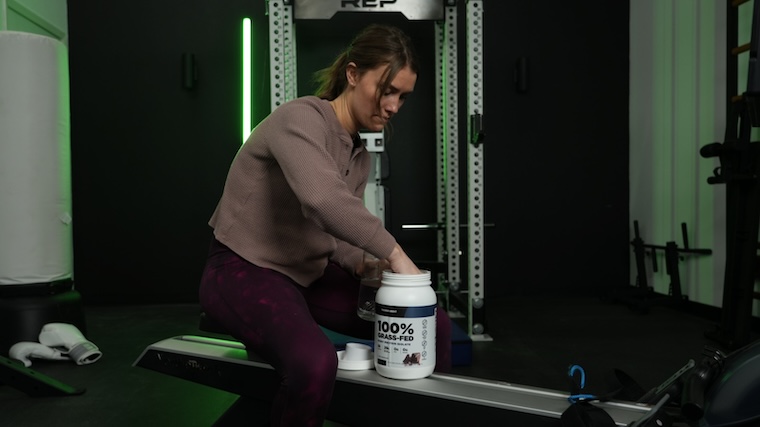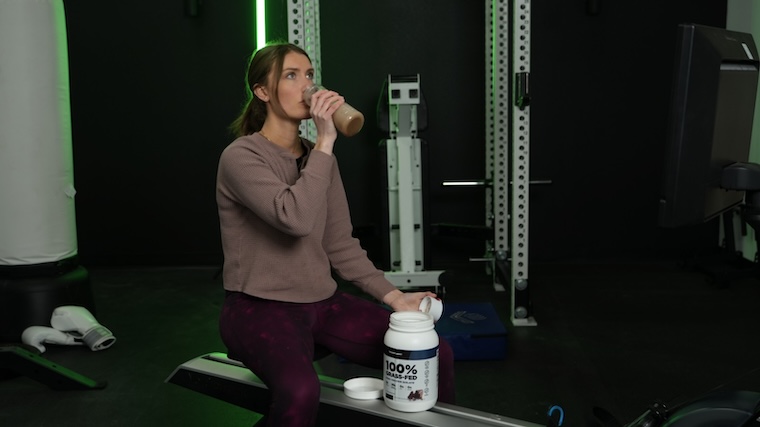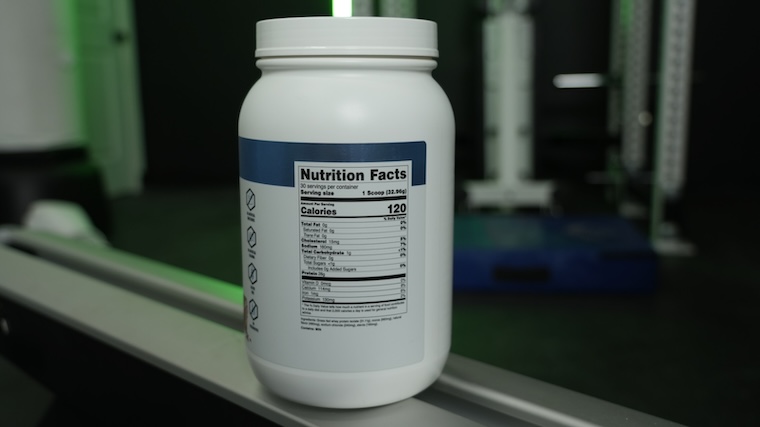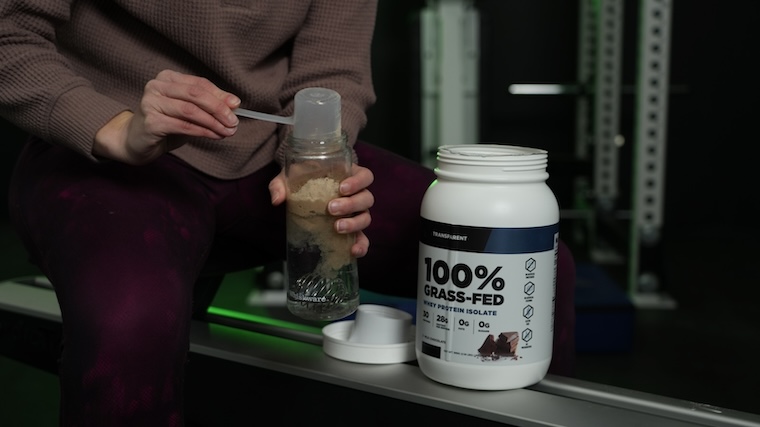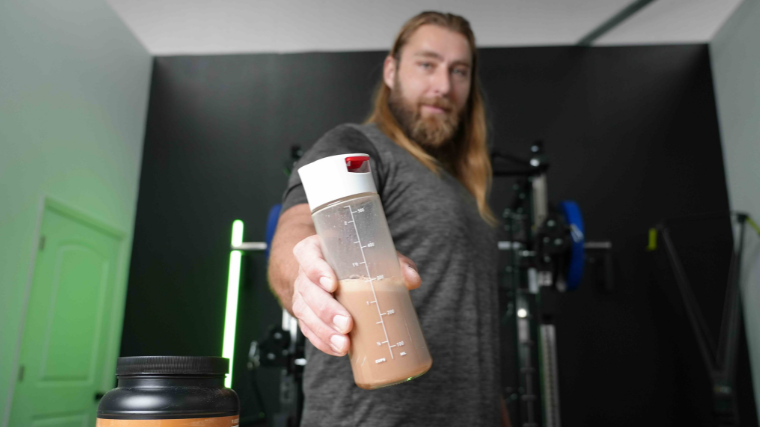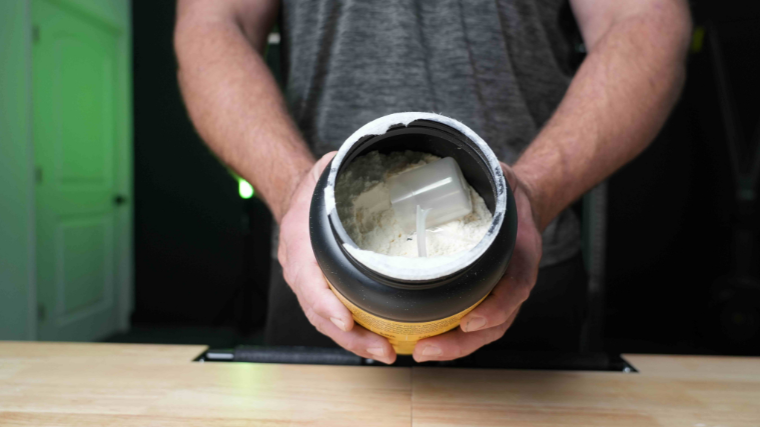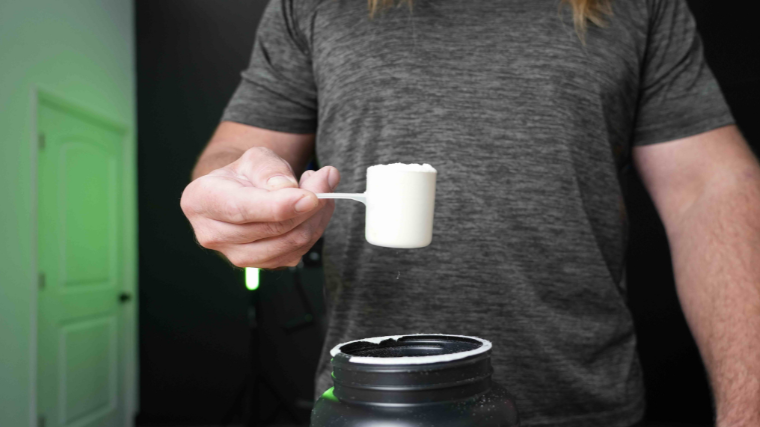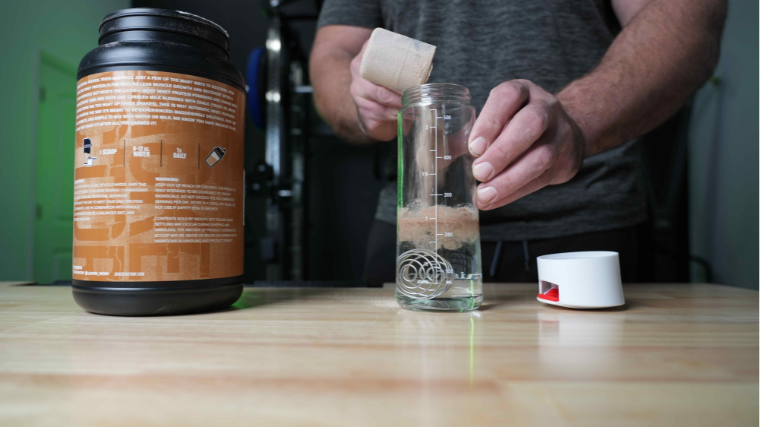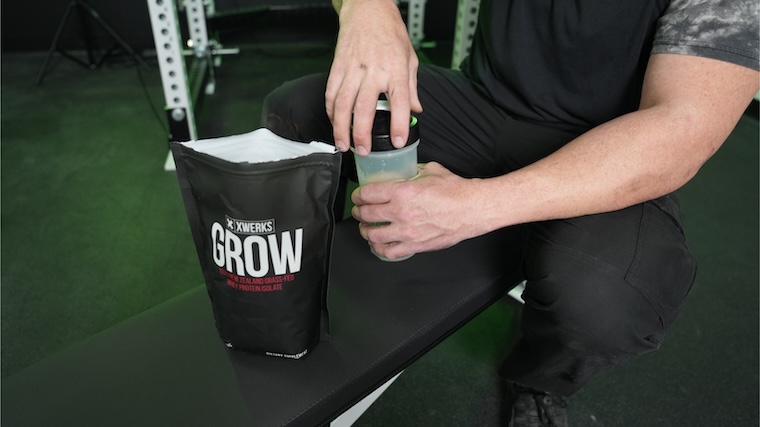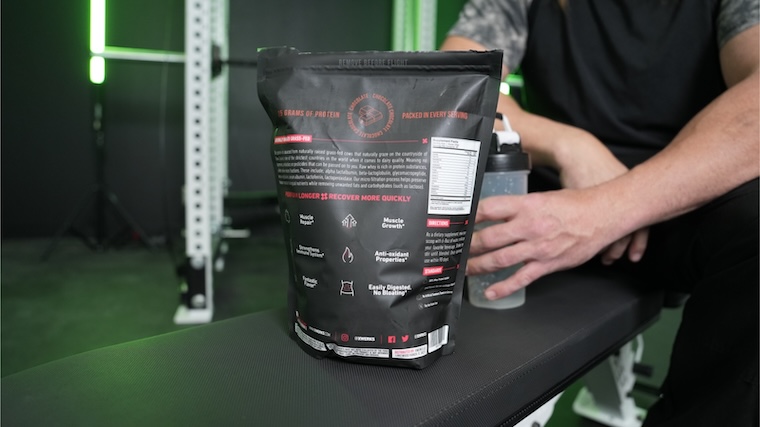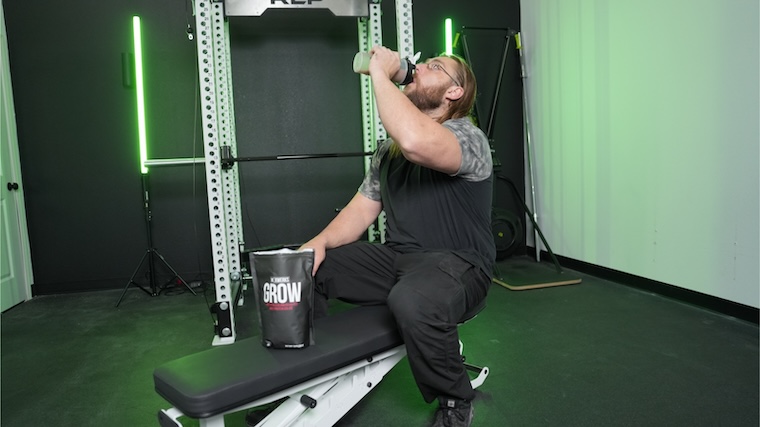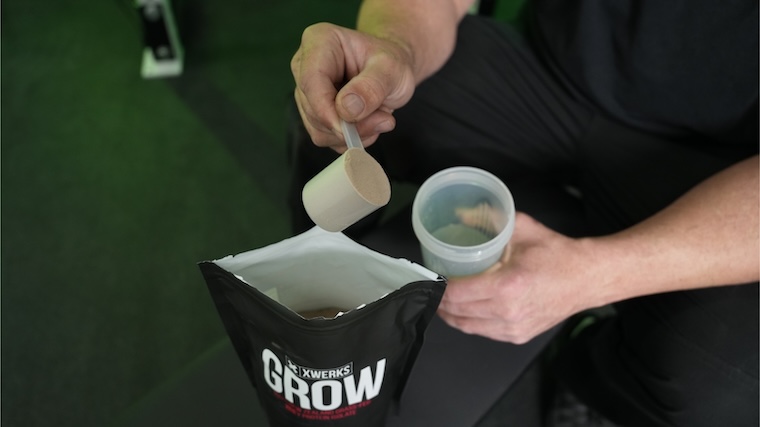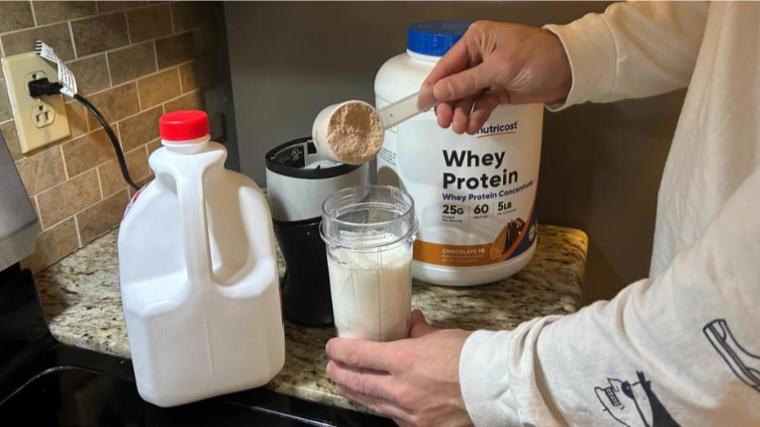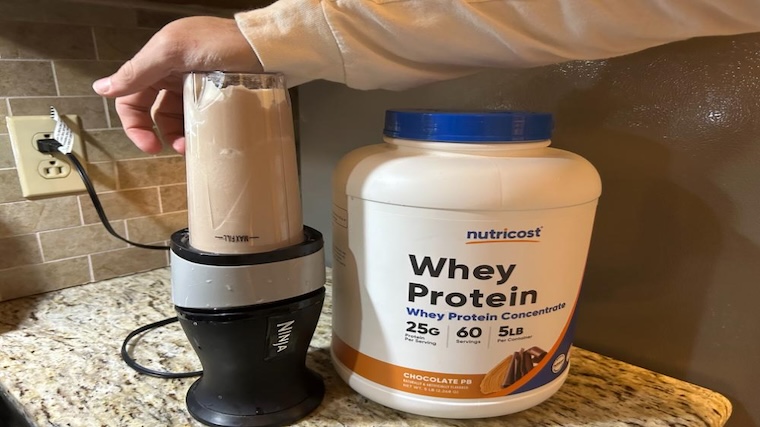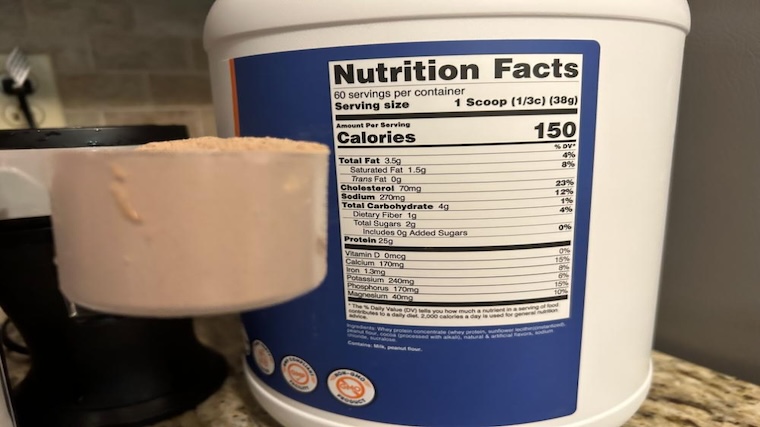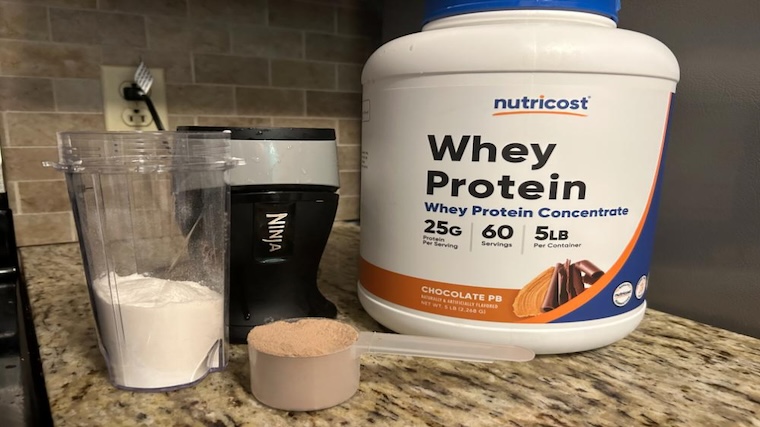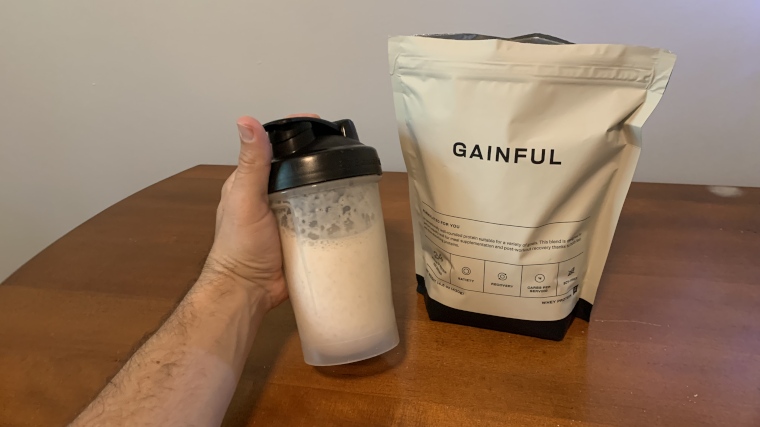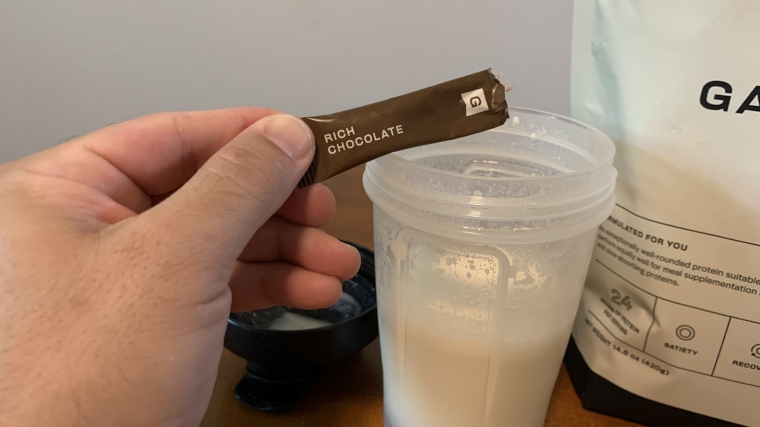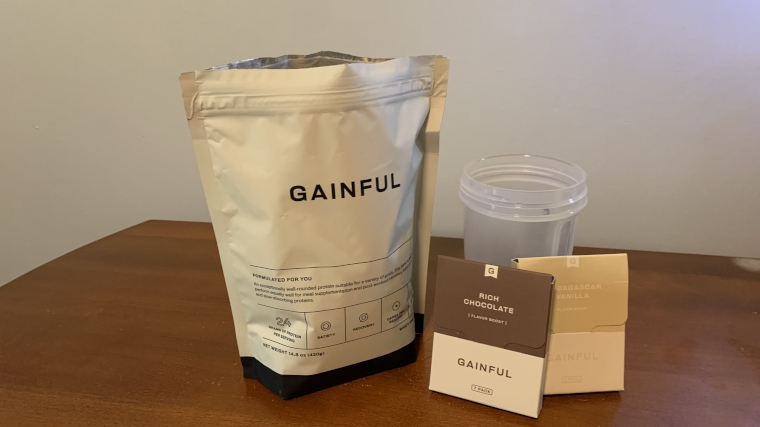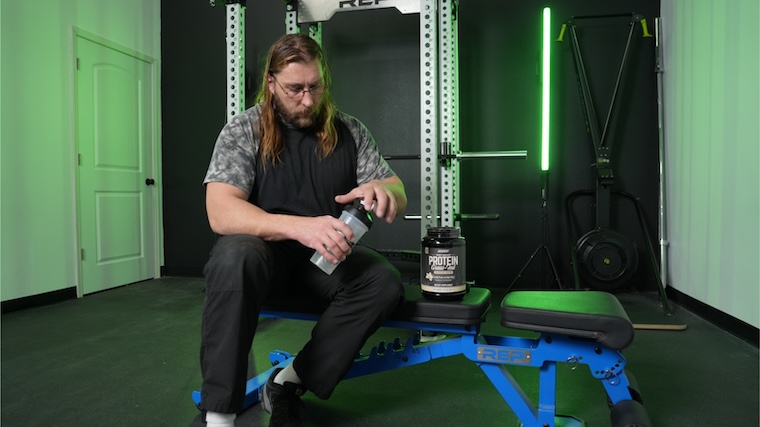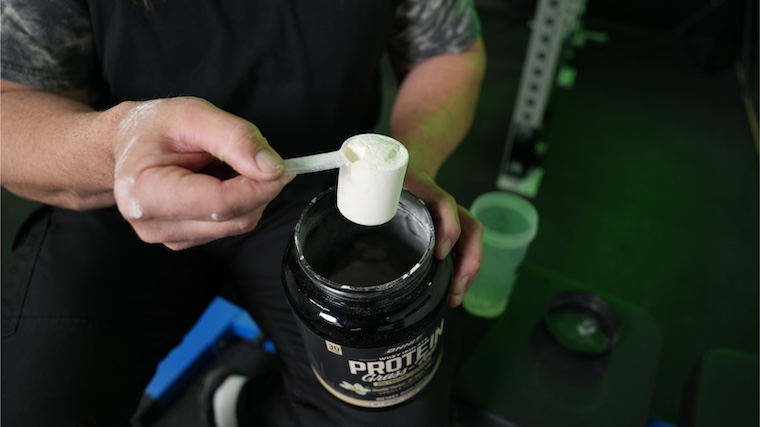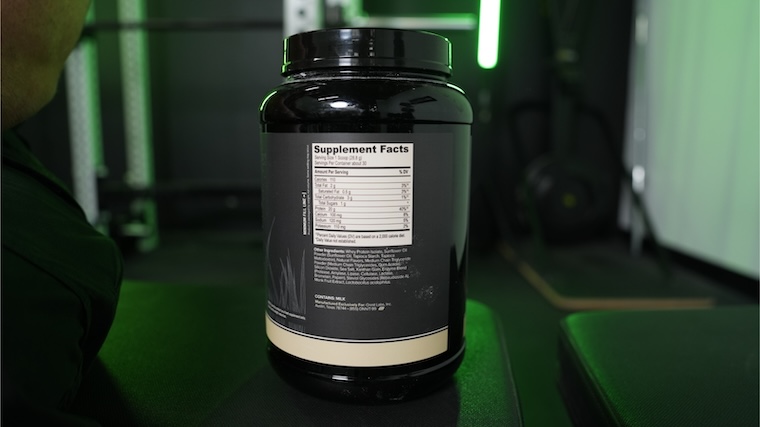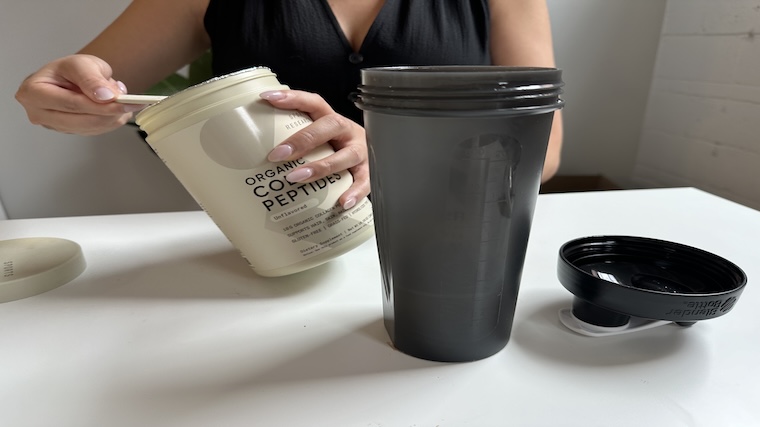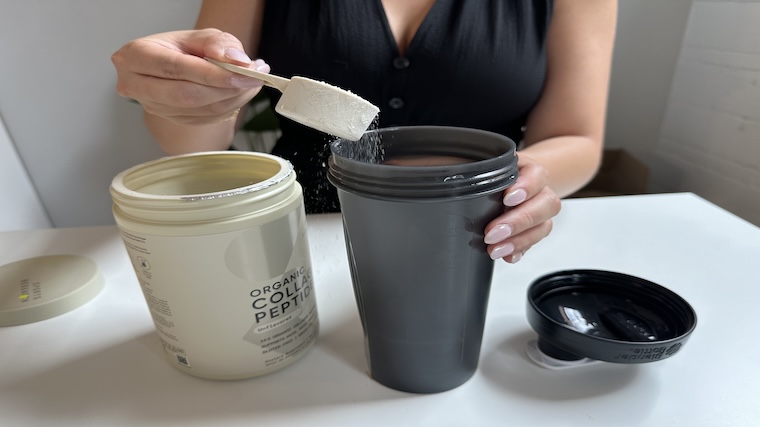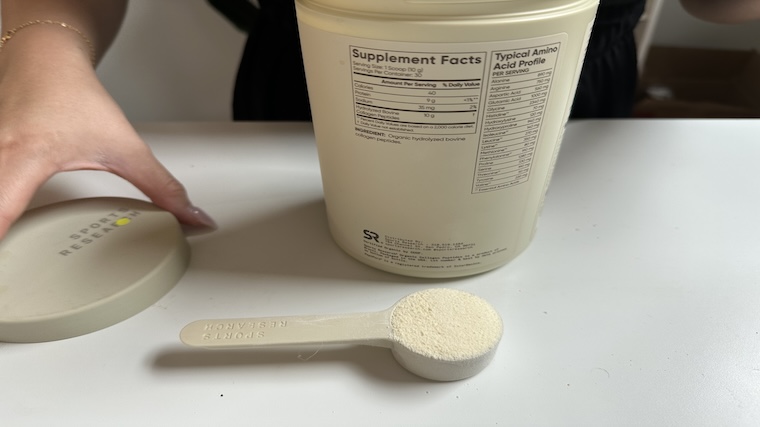Wondering what the keto diet is and whether you should try it? The keto diet is a popular choice among athletes, given its potential to help you lose weight while staying lean. It’s even shown promising results in supporting athletic performance, although more studies are needed to understand this relationship. (1) Following this diet involves strictly controlling your macros so that your diet is high in fat, low in carbs, and moderate in protein. (2)
But when every supplement seems high in carbs, we know the search can be challenging — even the best protein powders for keto can be difficult to decipher. To help you on your keto journey, we’ve gathered up our picks for the best keto protein powders (tested and trialed by our nutrition and fitness experts) based on criteria including fat and carb content, protein content and source, calories, flavor, value, mixability, and third-party testing.
The 7 Best Keto Protein Powders of 2026
- Best Keto Protein Powder Overall: Transparent Labs Whey Protein Isolate
- Best Keto Protein Powder for Weight Loss: Jacked Factory Authentic ISO
- Best-Tasting Keto Protein Powder: XWERKS Grow
- Best Budget Keto Protein Powder: Nutricost Whey Protein Concentrate
- Best Plant-Based Keto Protein Powder: Gainful Protein Powder
- Best Whey Keto Protein Powder: Onnit Grass-Fed Protein
- Best Keto Collagen Protein Powder: Sports Research Collagen Peptides
Editor’s note: The content on BarBend is meant to be informative in nature, but it should not be taken as medical advice. The opinions and articles on this site are not intended for use as diagnosis, prevention, and/or treatment of health problems. It’s always a good idea to talk to your doctor before beginning a new fitness, nutritional, and/or supplement routine. Individual needs for vitamins and minerals will vary.
How We Tested and Chose the Best Keto Protein Powders
The BarBend team is made up of competitive athletes, certified personal trainers, and lifelong fitness enthusiasts. To determine the best keto protein powders, we’ve tested nearly 100 different supplements from some of the industry’s most trusted brands using a multi-point methodology to rate each profile on a scale of 1 (lowest) to 5 (highest). Below are some of the categories and components that played into our rankings.
We also worked with a third-party accredited lab of our own to rate and score a handful of picks, analyzing each product’s purity and label accuracy. Ratings for areas including the presence of metals, pesticides, phthalates, bisphenols, and overall label accuracy were based on how well each protein sample compared to others in the sample pool.
For further information on how we trial and test the products chosen for this guide and more, be sure to read the BarBend Supplement Testing Methodology page.
- Fat Content: Since following the keto diet requires high fat intake, we’ve tried to include options that contain good fat sources like healthy fats or allow bulking up with fats like nut butter or MCT oil.
- Net Carbs: Many keto dieters count net carbs. To calculate net carbs, take the total carbs on the label and subtract the grams of dietary fiber and half of the grams of sugar alcohol. (3) All the picks we’ve included in our review are low in total and net carbs, so rest assured they’re compatible with your keto diet.
- Protein Source and Content: Consuming too little protein can be prohibitive in maintaining muscle mass, while too much protein can kick your body out of ketosis. The powders on this list contain moderate protein from various sources to fit your lifestyle.
- Calories: Our team counted and included the calories per serving in each keto protein powder since you may be watching your calories for weight gain, maintenance, or loss.
- Flavor and Taste: Taste is very subjective, but we’ve trialed everything from unflavored to chocolate peanut butter to provide you with a wide range of flavors to consider if you’re undecided. You may also want to check out our vote for the best-tasting keto protein powder.
- Value: Supplementing can be expensive, especially if you are taking other supplements to support your nutrition and fitness goals. The average American spends $124 per month on fitness, so we tried to be budget-conscious in our recommendations and even provided what we believe is the best budget keto protein powder for you to consider. (4)
- Solubility: Many protein powders just don’t mix well. Our team of product testers tried all the products on our list to see how they fare when combined in various beverages, from water to whole milk, and whether in a shaker bottle or electric blender.
- Credibility: Third-party testing organizations can help evaluate products for their purity, safety, quality, and ingredient accuracy. We’ve included many third-party-tested keto powders in this review.
Best Keto Protein Powder Overall: Transparent Labs Whey Protein Isolate
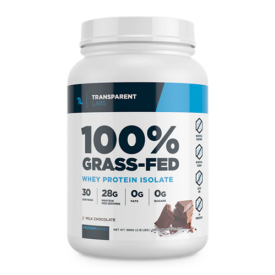
With 8 different flavors and 28 grams of whey protein from hormone-free, grass-fed cows, Transparent Labs Whey Protein Isolate is an excellent way to hit your protein macros.
Specs
- Price Per Serving: $2.00
- Protein Source: Whey Protein Isolate
- Protein Per Serving: 28 grams
- Calories Per Serving: 130 to 140 calories
- Available Flavors: Milk Chocolate, French Vanilla, Chocolate Peanut Butter, Dark Chocolate, Unflavored, Strawberry Milkshake, Cinnamon French Toast, Mocha, Vanilla Peanut Butter, Mint Chocolate Chip, Blueberry Pancakes, Peanut Butter, Vanilla Oatmeal Cookie, Sugar Cookie, Oatmeal Chocolate Chip Cookie
- Third-Party Testing: Informed Choice, Informed Protein, Various Laboratories
If you’ve ever wondered, “Is whey protein keto?” – the answer is yes! Transparent Labs Whey Protein Isolate is our favorite keto protein powder overall – it contains a high-quality protein source and electrolytes without the fluff. With 13 delicious and decadent flavors that are compatible when blended with high-fat nut butter, MCT oil, or coconut oil, this pick doesn’t disappoint.
As registered dietitians, Chelsea Rae Bourgeois, M.S., R.D.N., L.D., and I rated the formula a 4 out of 5. Bourgeois states, “I love that Transparent Labs Whey Protein Isolate is free from artificial sweeteners, food dyes, and preservatives. You get 28 grams of high-quality protein without any unnecessary fluff. Plus, it’s third-party tested, with certificates of analysis available to view on their website.” This formulation also contains whey isolate, so your body digests the protein more readily than other protein sources. (5)
Another benefit of this formula is that it contains electrolytes (sodium and potassium), which can help ward off the keto flu when you first start a keto diet. (6) “Some flavors contain up to 370 milligrams of sodium per scoop, which is higher than many other protein powders on the market,” Bourgeois adds. It’s also low in net carbs, with only 1 gram of net carbs per serving, which is perfect for keto.
However, since the keto diet calls for higher fat content, we wish it contained more fat from healthy sources like MCT oil, coconut, or nuts. Pro Tip: We recommend bulking up the fat macros by adding some nut butter and oat or coconut milk — with the delicious flavors this product offers, you can whip up some filling milkshakes. Our tester states, “This Transparent Labs sample left me plenty satiated and served as a great addition to my meals or in-between snacking protocols.”
As for taste, we gave this product a score of 4 out of 5, with some potential upside when blended into a milkshake. We loved that it came in many different flavors, so you’re bound to find one that you’ll enjoy. “I did feel that the taste was somewhat chalky at times but by no means overwhelming or unappealing,” our tester adds.

Moreover, we tested Transparent Labs Whey Protein Isolate for heavy metals, pesticides, phthalates, bisphenols, and label accuracy with an accredited, independent lab, Ellipse Analytics. It ranked in the top 25% of more than 150 protein products tested and received an overall B grade. So, if you’re looking for a solid protein base for milkshakes that’s low in net carbs, contains high-quality protein, and supports keto flu symptoms, try Transparent Labs Whey Protein Isolate. It’s a little pricier, but it may be worth it.
Read our full Transparent Labs Whey Protein Isolate Review.
Best Keto Protein Powder for Weight Loss: Jacked Factory Authentic ISO
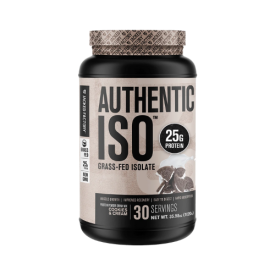
Dig into this easily digesting grass-fed whey isolate that provides 25 grams of protein with each lean 110 calorie scoop. It comes in three tasty flavors at a cost-effective price making it a solid choice for nearly anyone.
Specs
- Price Per Serving: $1.33
- Protein Source: Grass-Fed Whey Protein Isolate
- Protein Per Serving: 25 grams
- Calories Per Serving: 110 calories
- Available Flavors: Chocolate Peanut Butter, Milk Chocolate, Cookies & Cream, Blueberry Muffin, Cinnamon French Toast, Unflavored, Vanilla Oatmeal Cookie, Vanilla, Peanut Butter
- Third-Party Testing: No
To lose weight, you’ll want to achieve what’s called a calorie deficit. This means that to lose about a pound a week, you’d need to reduce your calories by 3,500 calories through a combination of diet and exercise. (7)
While supplementing with protein powders helps, many of them are too high in carbs or calories. With only 110 calories and 1 gram of carbs per serving, Jacked Factory Authentic ISO has a low-carb, low-calorie nutritional profile that’s ideal for supporting your weight loss. It also boasts a simple ingredient list and uses whey isolate as the protein source, which digests more efficiently than standard whey, making it one of the best protein powders for sensitive stomachs. (5)
Chelsea Rae Bourgeois, M.S., R.D.N., L.D., who is a registered dietitian, commended the formulation and rated it a 4.25 out of 5. She states, “I like that Jacked Factory uses whey protein from 100% grass-fed cattle, and I love its macro breakdown. Each scoop has an impressive 25 grams of protein with minimal carbohydrate and fat content.”
The only downsides with this formulation are the sodium content and the lack of third-party testing. While sodium can help mitigate symptoms of the keto flu, some flavors provide up to 300 milligrams of sodium, which may be too high. For context, the USDA recommends limiting sodium intake to less than 2300 milligrams per day. (8) “If you’re watching your sodium intake for any reason, you might not be keen on this protein powder,” Bourgeois adds.
Another great reason why this product is excellent for weight loss is its excellent taste. While many ‘diet’ products often taste horrible, this protein powder is absolutely delicious. Our tester rated it a 5 out of 5. “I liked the slightly sweet profile, and the stevia included in the formulation didn’t taste overwhelming. I mixed the Vanilla flavor with milk and ice, which seriously tasted like a diner milkshake.”
As for solubility and texture, our tester rated this product a 4 out of 5. Our tester states, “I blended this powder in my standard shaker bottle and with a cup and spoon. In both scenarios, the powder dissolved easily within 10 seconds without sticking to the sides. There weren’t any clumps or residue, but it’s a bit on the thicker side.” Pro Tip: We recommend using this supplement as a meal replacement, post-workout treat, or after-dinner dessert to help curb your sweet cravings and calorie intake. Some people, though, may not like the thick texture.
Overall, if you need a keto protein powder with a thick and creamy texture, excellent macros, and great taste to support your weight loss goals, try Jacked Factory.
Read our full Jacked Factory Authentic ISO Review.
Best-Tasting Keto Protein Powder: XWERKS Grow
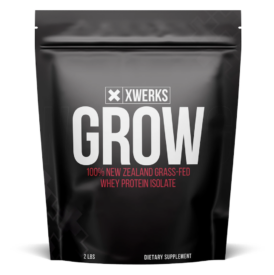
One of the very few protein powders with no carbs or fat whatsoever, this product contains 25 grams of whey protein isolate and is great for anyone looking for a leaner protein option.
Specs
- Price Per Serving: $1.87 to $1.97
- Protein Source: Whey Protein Isolate
- Protein Per Serving: 25 to 28 grams
- Calories Per Serving: 110 calories
- Available Flavors: Chocolate, Vanilla, Peanut Butter, Strawberry
- Third-Party Testing: No
Look no further if you want a keto-friendly protein powder that tastes like chocolate milk. With over 500 5-star reviews on the XWERKS website and sparkling reviews on Amazon, XWERKS Grow is your best bet if taste is a priority. Our product tester, who is a certified personal trainer, loved this product’s taste. They rated its taste a 5 out of 5, and they note, “Honestly, the Chocolate variety reminds me of a bottle of Yoo-hoo. It’s smooth, creamy, and just plain enjoyable – it’s the finest protein powder I’ve ever consumed.”
This pick also blends seamlessly with no clumps or residue. Our tester rated it a 5 out of 5 for its texture, stating, “I had no problems when mixing this powder. The texture is very smooth, and there are no clumps. You barely need a blender ball at all.” However, the texture can be a little thin for some people, so we recommend mixing it with a dairy base rather than water – you can also add nut butter for additional fats and to bulk up your shake while on keto since the fat content in the powder itself is a little low.
We rated this product’s excellent formulation a 4.5 out of 5, with high marks for its protein content and natural sweeteners. It’s one of the best clean protein powders out there and consists of 100% New Zealand-based grass-fed cow’s milk. Chelsea Rae Bourgeois, M.S., R.D.N., L.D. states, “I like that XWERKS Grow is a lean protein powder, providing 25 grams of protein per scoop. And with 6 grams of BCAAs, it’s ideal for muscle building.” Plus, since the protein source is whey isolate, it’s great for digestion, and the branched-chain amino acids (BCAAs) can support your recovery after exercise. (5)(9)
While on the pricier side, XWERKS Grow does provide 25 grams of protein per serving, and if the taste is important to you, this pick is a delicious and nutritious option for your keto lifestyle.
Read our full XWERKS Grow Review.
Best Budget Keto Protein Powder: Nutricost Whey Protein Concentrate
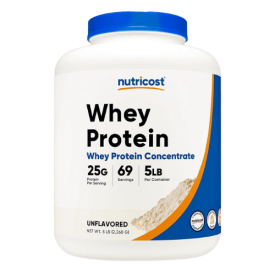
Need a protein powder that’s light on cost yet heavy on flavor? Available in four traditional tastes — Chocolate Peanut Butter, Chocolate, Strawberry Milkshake, and Vanilla — this Nutricost offering is available for less than $1 per serving, which can be ideal for athletes looking to build a well-rounded supplement regimen on a budget.
Specs
- Price Per Serving: $0.88 to $1.50
- Protein Source: Whey Protein Concentrate
- Protein Per Serving: 25 grams
- Calories Per Serving: 140 calories
- Available Flavors: Chocolate, Vanilla, Unflavored, Chocolate Peanut Butter, Strawberry Milkshake
- Third-Party Testing: Yes, but doesn’t disclose who does the testing
You may not have heard of Nutricost, but the brand name says it all – you get a nutritious protein powder at a fair cost. While the flavors are pretty standard, if you know what flavor you want to get, you can buy the 5-pound tub at an economical price of $0.88 per serving. That can go a long way since the average person spends a whopping $124.40 monthly on fitness. (4) After all, why worry about limiting intake to the best time to drink a protein shake when you can drink several shakes a day for the price of one standard shake?
For a value formulation, the mixability and taste aren’t too shabby. Our tester rated the taste a 5 out of 5 and states, “Having used this protein daily for a few weeks, I can confidently say I enjoy this product. I mixed it with water and milk interchangeably and felt the flavor come alive with milk. The Chocolate Peanut Butter flavor is super creamy and just the right amount of sweet.”
It also mixes well in water, dairy, and smoothies without making a mess, a common problem with ketogenic diet protein shakes. “Even with just a shaker bottle, I had no issues with this powder’s solubility. There weren’t any clumps or residue, and the texture turned out fine,” our tester adds.
Despite the cheap cost, Nutricost Whey Concentrate is a pretty lean protein with an impressive amino acid profile that doesn’t skimp on nutrients. Chelsea Rae Bourgeois, M.S., R.D.N., L.D. states, “Nutricost Whey Concentrate is a fairly lean protein powder. It still provides more carbs and fat than your average powder, but it prioritizes protein over the other macros. Plus, it contains a 2:1:1 ratio of your BCAAs, which research has shown to be most effective.” Its protein source is whey concentrate, which is a more concentrated version of standard whey, to provide you with as much protein density as possible with 25 grams per serving. (5)
However, one big downside is that this product includes artificial sweeteners (sucralose and acesulfame potassium), so Bourgeois rated it a 3.5 out of 5. “This whey protein contains sucralose, which can be hard to digest for some,” Bourgeois states. It also contains sunflower lecithin as an emulsifier, which is a filler ingredient that doesn’t contribute to nutritional value. And while it’s produced in a GMP-compliant facility and supposedly third-party tested, Nutricost doesn’t disclose who does the third-party testing. So, while Nutricost is budget-friendly, it’s not among the cleanest options available.
Best Plant-Based Keto Protein Powder: Gainful Protein Powder
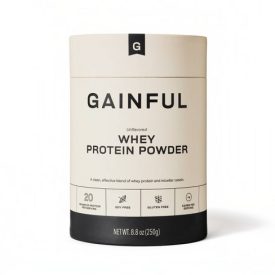
Gainful Protein Powder is fully customizable, allowing you to get a product that meets your specific health needs, including losing weight, gaining weight, or building muscle.
Specs
- Price Per Serving: $2.32 to $3.21
- Protein Source: Organic Pea Protein, Organic Brown Rice Protein
- Protein Per Serving: 24 grams
- Calories Per Serving: 120 calories
- Available Flavors: Unflavored; flavor boosts include Sea Salt Caramel, Rich Chocolate, Cinnamon Toast, Cookies & Cream, Caffe Mocha, Chocolate Peanut Butter, Strawberry Cream, Madagascar Vanilla
- Third-Party Testing: No
If you’re searching for one of the best vegan protein powders, Gainful allows you to personalize your own plant-based, keto-friendly powders. With only three simple, vegan, and plant-based ingredients – organic pea protein, organic brown rice protein, green tea extract – it’s an ideal plant-based protein powder for keto diets. While following a keto diet can consist of eating many animal-based, high-fat foods, a plant-based version of keto consisting of healthy fats can help minimize the effects of eating many animal-based foods. (10)
And while plant-based powders often aren’t flavorful, you can choose your own adventure with Gainful. Our product tester, who is a certified personal trainer, rated the taste a 5 out of 5. They state, “The base powder comes unflavored, and Gainful gives you different flavor packs that allow you to mix up flavors from shake to shake. I liked the Chocolate and Vanilla flavors, but there are plenty more to choose from.”
However, as is the case with a lot of plant-based powders, the mixability wasn’t great. Our tester states, “I did find some clumps when mixing this powder, so I’d recommend using a countertop blender to ensure you break up all the powder. I dealt with it at the start because I enjoyed the taste, but I’ll likely break out the heavy artillery for future tests to achieve a smoother, less clumpy makeup.” While our tester rated the solubility a 3 out of 5 compared to other whey options, we think it’s appropriate for a plant-based powder.
One of the biggest perks of choosing Gainful is that you get matched to a personalized protein powder to help your specific needs and access registered dietitians who are experts in sports nutrition. Our tester states, “Gainful has you complete a short quiz that asks you about your fitness goals and then creates a protein powder profile for you. Plus, as part of your Gainful membership, you get access to a registered dietician to help you along your nutritional journey — a great perk, in my opinion, for newcomers.”
Having access to a registered dietitian can help in many ways, but especially for athletes with ever-changing fitness and performance goals, it’s helpful to get a second opinion throughout their journey. With the support of an RD, you could ask not only about the benefits of different types of protein but also common questions like keto vs. paleo diet. Chelsea Bourgeois, M.S., R.D., L.D.N., states, “Dietary goals change over time, as do nutrition needs, so it’s great that there’s support in place when customers have questions about switching formulas.”
As registered dietitians, Bourgeois and I rated the formulation a 4.5 out of 5. Bourgeois states, “I like that the protein powders are unsweetened and free from artificial ingredients and that Gainful offers a personalized protein powder formula.” The USDA recommends limiting added sugar intake to less than 10% of your daily calorie intake, so this powder can help you toward that goal. (8) While this powder is pricier, its benefits might be worth it for a plant-based keto dieter.
Read our full Gainful Protein Powder Review.
Best Whey Keto Protein Powder: Onnit Grass-Fed Protein
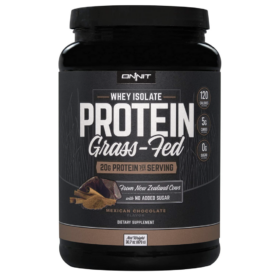
A grass-fed whey isolate includes added ingredients for digestion like seven digestive enzymes and a probiotic (lactobacillus acidophilus). It's also gluten-free, sugar-free, and soy-free.
Specs
- Price Per Serving: $1.80 to $2.00
- Protein Source: Grass-Fed Whey Protein Isolate
- Protein Per Serving: 20 grams
- Calories Per Serving: 110 calories
- Available Flavors: Vanilla, Mexican Chocolate
- Third-Party Testing: No
Out of the whey protein options out there, whey protein isolate (like the protein source found in Onnit Grass-Fed Protein) is excellent since it’s highly digestible. (5) It’s a lean whey protein powder with 20 grams of protein and a complete amino acid profile to help build muscle. (11) Moreover, the isolate in this formulation is non-GMO and derived from Irish, grass-fed cows that graze an average of 250 days a year.
For those who prefer more natural options, grass-fed options like Onnit Grass-Fed Protein or the best organic protein powders would work best. Those who are looking for lactose-free options can also take Onnit since whey isolate is virtually lactose-free – although it does contain milk proteins.
Chelsea Rae Bourgeois, M.S., R.D., L.D.N., rated the formulation a 4.5 out of 5 and agrees that it’s an excellent whey option for keto diets. She states, “I like the macronutrient ratio that Onnit Whey Protein provides – 20 grams of protein, around 2 grams of fat, and 3 to 4 grams of carbs. And I like that Onnit includes an enzyme blend in their ingredients to help promote good digestion.” It also contains probiotics like Lactobacillus Acidophilus for digestive support. (12)
As a registered dietitian, I wish it would have more than 20 grams of protein, although it may work for a strict keto diet that doesn’t call for a lot of protein. While most people can get away with consuming only 0.8 grams of protein per kilogram per day, some athletes need up to 1.6 grams of protein per day, so 20 grams might not be sufficient to meet their daily protein needs. (8)(13)
This pick also mixes fairly well – it’s rated a 5 out of 5 for solubility. Our tester, who is a certified personal trainer, states, “I had no issues regarding solubility, but the texture is thinner than other proteins, especially when mixed with water. There were no clumps or ‘floaties’ to speak of.” If you prefer protein shakes with thicker textures, you may want to add it to whole milk or oat milk for extra creaminess.
However, if you’re a flavor enthusiast, you may want to look elsewhere for a protein that offers more variety. This protein powder is only available in two flavors – vanilla and chocolate – so it won’t satisfy a pickier palate. “I sampled the Mexican Chocolate variety and found the flavor to be pretty good and decadent when mixed with a milk product,” our tester adds, rating the product a 3.75 out of 5. Overall, for a clean whey option that promotes good digestion and offers excellent solubility, try Onnit Grass-Fed Protein.
Read our full Onnit Grass-Fed Protein Review.
Best Keto Collagen Protein Powder: Sports Research Collagen Peptides
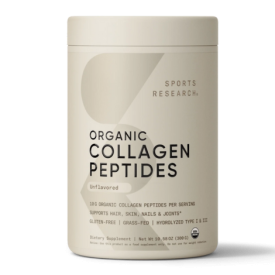
Sports Research Organic Collagen Peptides is great in your morning coffee or in a smoothie, thanks to its fantastic absorption. It offers 11 grams of Types 1 and III collagens as well as 18 amino acids.
Specs
- Price Per Serving: $0.62 to $1.29
- Protein Source: Hydrolyzed Bovine Collagen Peptides
- Protein Per Serving: 10 grams
- Calories Per Serving: 40 calories
- Available Flavors: Unflavored
- Third-Party Testing: NSF Certified Gluten-Free, Non-GMO Tested, Informed Choice
Sports Research Collagen Peptides provides an impressive amino acid profile with 11 grams of collagen peptides per serving. It’s clean and boasts a simple ingredient list, making it one of the best dairy-free protein powders (since collagen is a building block for connective tissue and not a dairy product).
Our product tester, a former Olympian, tried this pick with both water and coffee and enjoyed it. They rated the taste a 5 out of 5 and the solubility a 5 out of 5. They state, “With water, you could tell there was an additive, but the overall taste wasn’t off-putting or overly strong.”
They also noted that it mixes easily in a shaker bottle without sticking or ‘floaties.’ “I did have some foam at the top of the mixture. I also successfully added this to hot coffee, blending the powder easily with a spoon. The end results don’t have any gritty texture, but the brand does have a warning label that residue can form if you blend the powder with a colder beverage,” our tester adds.
Chelsea Rae Bourgeois, M.S., R.D., L.D.N., also tried the product and was a big fan of the formulation. She gave it a score of 4.5 out of 5. She states, “I like that Sports Research only uses one ingredient in their collagen: hydrolyzed bovine collagen peptides. Hydrolyzed peptides are said to be easier to digest and utilize.” With no net carbs or sugar, this formulation is easy to incorporate into a keto diet and could support your body in many ways. “This formulation can also support healthy skin, hair, joints, and nails, along with muscle recovery,” Bourgeois adds.
However, if you’re looking for more protein in your collagen supplement, consider a whey or one of the best casein proteins that contain more protein per serving. The serving size is also small at 11 grams per serving. Most collagen supplements tend to be lower in protein content, though, so it’s not unusual to see – they often come in small packets and not bigger scoops. Overall, these aren’t too big of a downside if collagen is your protein source choice – and this pick is as clean as collagen gets and one of the best collagen peptide supplements out there.
Benefits of Keto Protein Powders
While different versions of the keto diet can vary, the typical macronutrient distribution of the keto diet consists of 55 to 60% fat, 30 to 35% protein, and 5 to 10% carbohydrates. (2) While this is a tough diet to follow, the best keto protein powders help you adhere to these macros while offering health benefits for athletes. Read on to learn more about protein powder benefits when incorporated into your keto diet.
- Helps you stay in ketosis: Keto protein powders align well with the macronutrient restrictions required of the keto diet and often include ingredients that can help promote ketone production and stay in ketosis.
- Low in net carbs: To realize the health benefits of keto, ketone bodies need to replace glucose as the primary energy source – meaning, your diet needs to be very low in net carbs. (2) The best keto protein powders contain less than 5 grams of carbs to help limit your carb intake.
- May support athletic performance: For shorter, vigorous exercises, following a ketogenic diet for strength training may help support athletic performance – but more research is needed to understand this effect since weight loss in this group added noise to the results. (1)
- Provides a good base for shakes: While many keto protein powders aren’t high in fat, they’re great protein bases for protein shakes, making it easy for you to add coconut oil, MCT oil, and nut butter to add fat to your keto diet.
- Meet your protein needs: Keto protein powders are a convenient way to meet your protein requirements without overeating food. Adequate protein intake through supplements like the best whey protein powders can help support maintaining or gaining muscle mass. (11)
- Minimize side effects: High-quality protein powders often contain electrolytes like sodium and potassium to help mitigate the side effects of the keto diet, also known as the keto flu. (6)
How Much Do Keto Protein Powders Cost?
Keto protein powders typically cost from $0.62 for the most economical option to $3.21 for a more premium option, depending on the brand, ingredients, and quality. For example, premium options with added benefits like medium-chain triglyceride oil or digestive enzymes can cost more.
For a fair comparison, look at the cost per serving and evaluate the amount of protein and scoops each serving contains. We’ve provided cost comparisons based on cost per serving.
| Best Keto Protein Powder Overall | Transparent Labs Whey Protein Isolate | $2.00 |
| Best Keto Protein Powder for Weight Loss | Jacked Factory Authentic ISO | $1.33 |
| Best-Tasting Keto Protein Powder | XWERKS Grow | $1.87 to $1.97 |
| Best Budget Keto Protein Powder | Nutricost Whey Protein Concentrate | $0.88 to $1.50 |
| Best Plant-Based Keto Protein Powder | Gainful Protein Powder | $2.32 to $3.21 |
| Best Whey Keto Protein Powder | Onnit Grass-Fed Protein | $1.80 to $2.00 |
| Best Keto Collagen Protein Powder | Sports Research Collagen Peptides | $0.62 to $1.29 |
What to Consider Before Buying Keto Protein Powders
When buying a keto protein powder that isn’t on our list of picks, be sure to consider factors like macronutrient content, micronutrient content, ingredient quality, and protein source to find a product that fits within appropriate nutrition for athletes.
Fat Content
A keto diet is low carbohydrate, high fat, and moderate protein. When adhering to this dietary pattern, your body uses fats to produce ketones to use for energy instead of carbs and keep your body in ketosis. (2)

A good keto protein powder should be high in fat to support this diet. Or, since most protein powders are blended into shakes, it should show potential to serve as a good base for bulking up with other fats like nut butter, coconut oil, or MCT oil.
Net Carbs
The total number of net carbs to consume daily depends on the variety of keto diet you’re following. However, all varieties promote a low-carb diet with as few grams of carbohydrates as possible. (2) The best low-carb protein powders should contain less than 5 grams of net carbs on the label – you can calculate net carbs by taking the total carbs and subtracting the dietary fiber content and half of the sugar alcohol content (if applicable).
Digestive Support
While the keto diet can support wellness and various health benefits, it can also cause digestive discomfort like constipation, diarrhea, and bloating. (2) To help mitigate potential digestive issues, consider looking for a protein powder containing probiotics, prebiotics, or digestive enzymes to help support your gut health. Moreover, look for a powder with higher fiber content or blend with fruits and veggies into a smoothie to help you stay regular. (14)
Vitamins and Minerals
The keto diet is pretty restrictive, so if not appropriately managed, it can often result in nutrient deficiencies like vitamins, minerals, and phytochemicals. (15) As a registered dietitian, I typically recommend that my keto clients take a multivitamin or look for a protein powder supplement that provides higher daily values of micronutrients to prevent any nutrient deficiencies. While on keto, you should also get your bloodwork checked regularly.
Protein Source
Check the nutrition label for the protein source and ensure it contains a wide range of essential amino acids to support muscle growth. Depending on your dietary preferences, allergies, intolerances, and goals, you may want to opt for a specific protein source.
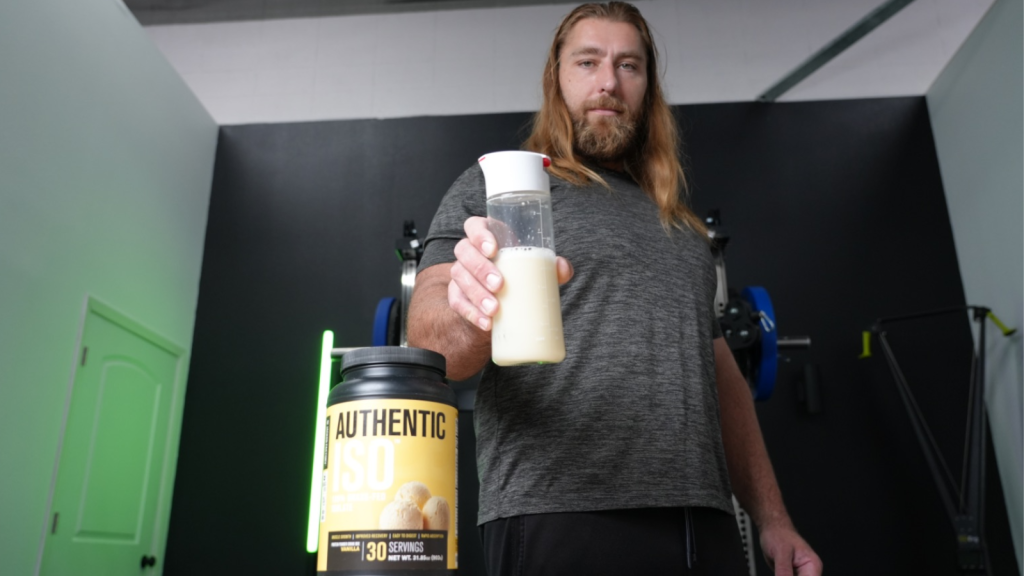
For example, if you prefer a slower digesting protein, you may want to try a casein protein, egg white protein, or one of the best whey isolates. Or, if you prefer plant-based sources, try a pea blend or pumpkin seed protein.
Ingredient List
Try to look for a protein powder that uses high-quality, natural ingredients – the ingredient list on the label should be short, simple, and free from artificial flavors or sweeteners, low-grade fillers, or preservatives. Studies show that eating a healthy diet consisting of primarily plant-based foods, low-sugar, and limited processed foods is positively correlated with “good” bacteria in the gut, which can help reduce the risk for chronic diseases like diabetes and heart disease. (16)
Keto Protein Powders FAQs
Should you take protein powder on keto?
While the keto diet consists of only “moderate” protein intake, protein powder can be beneficial for athletes who struggle to meet their daily protein needs from food alone. Consuming moderate protein intake through protein powders can help athletes maintain or gain muscle while staying in ketosis.
What is the best keto protein powder?
The best keto protein powder depends on your specific needs and goals, but good choices on a keto diet typically include a high-quality protein source, moderate protein content, low net carbs, added fats (or ones where you can seamlessly add fats to it), and a clean ingredient list. We think Transparent Labs Whey Protein Isolate is a solid keto protein powder choice for general wellness since it offers great macros for keto, helps ingredients that fight off keto flu symptoms, and ranks highly in independent third-party testing.
How much do keto protein powders cost?
At the low end of the range, whey-based keto protein powders can cost from $0.88 per serving, while collagen-based keto powders start at $0.62. More premium options at the high end of the range can cost up to $3.21 per serving, depending on the product’s ingredients, brand, and nutritional profile. Be sure to compare costs per serving for an accurate comparison since protein powders can have different serving sizes. For example, one product could have one scoop per serving, while another could have two.
References
- McSwiney, F. T., Doyle, L., Plews, D. J., & Zinn, C. (2019). Impact Of Ketogenic Diet on Athletes: Current Insights. Open Access Journal of Sports Medicine, 10, 171–183.
- Masood, W., Annamaraju, P., Khan Suheb, M. Z. (2023). Ketogenic Diet. Statpearls. Available at https://www.ncbi.nlm.nih.gov/books/NBK499830/
- Marcason W. (2004). What do “net carb”, “low carb”, and “impact carb” really mean on food labels? Journal of the American Dietetic Association, 104(1), 135.
- LendingTree. (2021). Fitness, Nutrition Spending Driving About 40% of Millennials and Gen Z into Debt. Available at https://www.lendingtree.com/credit-cards/study/fitness-nutrition-spending-debt/
- Foegeding, E. A., & Luck, P. J. (2002). Milk Proteins: Whey Protein Products. Encyclopedia of Dairy Sciences, 1957-1960.
- Nourish by WebMD. (2023). Remedies for Keto Flu. Available at https://www.webmd.com/diet/remedies-for-keto-flu
- Cleveland Clinic. (2022). Calorie Deficit: What To Know. Available at https://health.clevelandclinic.org/calorie-deficit
- U.S. Department of Agriculture and U.S. Department of Health and Human Services. Dietary Guidelines for Americans, 2020-2025. 9th Edition.
- Doma, K., Singh, U., Boullosa, D., & Connor, J. D. (2021). The effect of branched-chain amino acid on muscle damage markers and performance following strenuous exercise: a systematic review and meta-analysis. Applied Physiology, Nutrition, and Metabolism, 46(11), 1303–1313.
- Coulston A. M. (1999). The role of dietary fats in plant-based diets. The American Journal of Clinical Nutrition, 70(3 Suppl), 512S–515S. h
- Hulmi, J. J., Lockwood, C. M., & Stout, J. R. (2010). Effect of protein/essential amino acids and resistance training on skeletal muscle hypertrophy: A case for whey protein. Nutrition & Metabolism, 7, 51.
- Scarpellini, E., Basilico, M., Rinninella, E., Carbone, F., Schol, J., Rasetti, C., Abenavoli, L., & Santori, P. (2021). Probiotics and gut health. Minerva Gastroenterology, 67(4), 314–325.
- Nunes, E. A., Colenso-Semple, L., McKellar, S. R., Yau, T., Ali, M. U., Fitzpatrick-Lewis, D., Sherifali, D., Gaudichon, C., Tomé, D., Atherton, P. J., Robles, M. C., Naranjo-Modad, S., Braun, M., Landi, F., & Phillips, S. M. (2022). Systematic review and meta-analysis of protein intake to support muscle mass and function in healthy adults. Journal of Cachexia, Sarcopenia and Muscle, 13(2), 795–810.
- Barber, T. M., Kabisch, S., Pfeiffer, A. F. H., & Weickert, M. O. (2020). The Health Benefits of Dietary Fibre. Nutrients, 12(10), 3209.
- O’Neill, B., & Raggi, P. (2020). The ketogenic diet: Pros and cons. Atherosclerosis, 292, 119–126.
- Asnicar, F., Berry, S. E., Valdes, A. M. (2021). Microbiome connections with host metabolism and habitual diet from 1,098 deeply phenotyped individuals. Nature Medicine, 27, 321–332.
